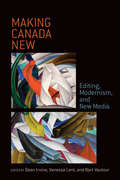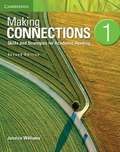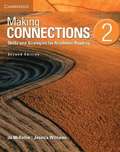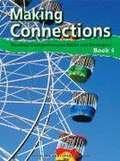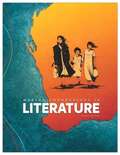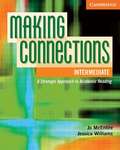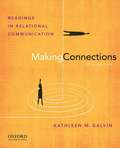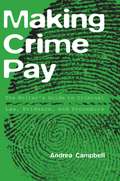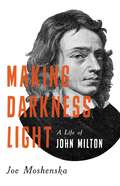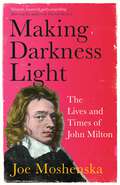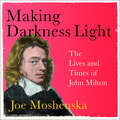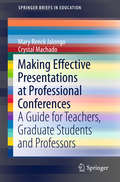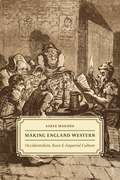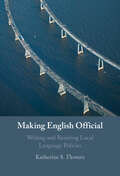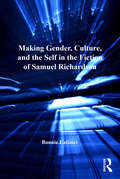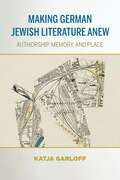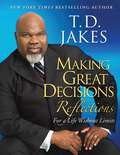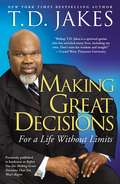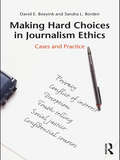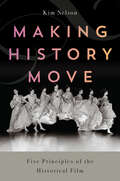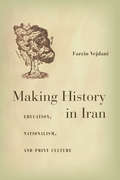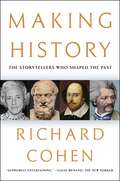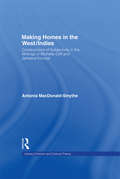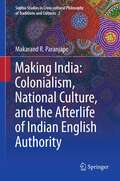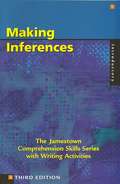- Table View
- List View
Making Canada New: Editing, Modernism, and New Media
by Dean Irvine Bart A. Vautour Vanessa LentAn examination of the connections between modernist writers and editorial activities, Making Canada New draws links among new and old media, collaborative labour, emergent scholars and scholarships, and digital modernisms. In doing so, the collection reveals that renovating modernisms does not need to depend on the fabrication of completely new modes of scholarship. Rather, it is the repurposing of already existing practices and combining them with others – whether old or new, print or digital – that instigates a process of continuous renewal. Critical to this process of renewal is the intermingling of print and digital research methods and the coordination of more popular modes of literary scholarship with less frequented ones, such as bibliography, textual studies, and editing. Making Canada New tracks the editorial renovation of modernism as a digital phenomenon while speaking to the continued production of print editions.
Making Connections (Second Edition): Level 1 : Skills and Strategies for Academic Reading
by Jessica WilliamsMaking Connections teaches an extensive range of reading skills and strategies in order to prepare students for college reading. <P><P>Making Connections Second edition Level 1 Student's Book introduces first-time readers of academic text to basic reading strategies such as finding paragraph topics, finding supporting details and learning to read quickly.<P> It features a variety of high interest topics including national borders, names, food, sleep, natural disasters, and music.
Making Connections 2: Skills and Strategies for Academic Reading, 2nd Edition
by Jo McentireMaking Connections teaches an extensive range of reading skills and strategies in order to prepare students for college reading. Making Connections Second edition Level 2 Student's Book introduces fundamental reading skills and strategies such as identifying main ideas, interpreting information in charts and graphs, and preparing for reading tests. It features a variety of high-interest topics including news media, education, global business, population growth, fashion and design, and the brain.
Making Connections Book 4
by Kay Kovalevs Alison DewsburyAdvance vital reading comprehension skills through a balance of appealing nonfiction and fiction titles, focus on strategies and skills critical for reading comprehension, and nonfiction features such as indexes, glossaries, tables of contents, and captions.
Making Connections in Literature Grade 8 Student Text
by Bju PressBJU Press’ Grade 8 Making Connections in Literature 4th Edition engages students with a variety of literary selections that follow the themes of Maturity, Wisdom, Generosity, Freedom, and Nature. In the Student Text, chapters ask Big Questions to guide students towards thinking about key literary features and cultural beliefs. Author backgrounds and biographies, defined vocabulary terms, and Before Reading sections prepare students for the literary passages. During Reading and After Reading sections and Think & Discuss questions assist students in analysis, evaluation, and text comparison. Writing assignments with rubrics and oral presentation provide students with opportunities to grow their ability to comprehend and consider the big ideas and biblical application of literature. A novel study on Across Five Aprils (sold separately) is also part of this course.
Making Connections, Intermediate Student's Book: A Strategic Approach to Academic Reading and Vocabulary
by Jessica Williams Jo McentireMaking Connections Intermediate is a reading skills and strategies book that prepares students for college-level reading. It has six high-interest thematic units, each with multiple readings. The readings are written in an accessible academic discourse style, providing practice for intermediate-level students who will eventually need to access authentic academic text.
Making Connections: Readings in Relational Communication
by Kathleen GalvinMaking Connections: Readings in Relational Communication, Fifth Edition, is a unique collection of readings that provides a balanced, timely, and challenging set of perspectives on relational communication. Edited by Kathleen M. Galvin, the volume includes diverse selections from the recent work of top communication scholars and teachers, offering a balance between humanistic and social-science perspectives. Each reading exposes students to the latest developments in the ever-changing field of interpersonal communication.
Making Crime Pay: The Writer's Guide to Criminal Law, Evidence, and Procedure
by Andrea CampbellMaking Crime Pay is an invaluable reference to criminal law, evidence, and procedure and the potential it holds for breathtaking plots and dramatic storytelling. Readers will learn in detail how criminal law has evolved historically, discover the differences between crimes and how they are judged in the eyes of the law, and understand law's mechanisms and loopholes from the first thought of a crime to the offender's arrest and trial.
Making Darkness Light: A Life of John Milton
by Joe MoshenskaAn innovative and elegant new biography of John Milton from an acclaimed Oxford professorJohn Milton was once essential reading for visionaries and revolutionaries, from William Blake to Ben Franklin. Now, however, he has become a literary institution—intimidating rather than inspiring.In Making Darkness Light, Oxford professor Joe Moshenska rediscovers a poet whose rich contradictions confound his monumental image. Immersing ourselves in the rhythms and textures of Milton&’s world, we move from the music of his childhood home to his encounter with Galileo in Florence into his idiosyncratic belief system and his strange, electrifying imagination.Making Darkness Light will change the way we think about Milton, the place of his writings in his life, and his life in history. It is also a book about Milton&’s place in our times: about our relationship with the Western canon, about why and how we read, and about what happens when we let someone else&’s ideas inflect our own.
Making Darkness Light: The Lives and Times of John Milton
by Joe MoshenskaFor most of us John Milton has been consigned to the dusty pantheon of English literature, a grim puritan, sightlessly dictating his great work to an amanuensis, removed from the real world in his contemplation of higher things. But dig a little deeper and you find an extraordinary and complicated human being.Revolutionary and apologist for regicide, writer of propaganda for Cromwell's regime, defender of the English people and passionate European, scholar and lover of music and the arts - Milton was all of these things and more.Making Darkness Light shows how these complexities and contradictions played out in Milton's fascination with oppositions - Heaven and Hell, light and dark, self and other - most famously in his epic poem Paradise Lost. It explores the way such brutal contrasts define us and obscure who we really are, as the author grapples with his own sense of identity and complex relationship with Milton. Retracing Milton's footsteps through seventeenth century London, Tuscany and the Marches, he vividly brings Milton's world to life and takes a fresh look at his key works and ideas around the nature of creativity, time and freedom of expression. He also illustrates the profound influence of Milton's work on writers from William Blake to Virginia Woolf, James Joyce to Jorge Luis Borges.This is a book about Milton, that also speaks to why we read and what happens when we choose over time to let another's life and words enter our own. It will change the way you think about Milton forever.
Making Darkness Light: The Lives and Times of John Milton
by Joe MoshenskaFor most of us John Milton has been consigned to the dusty pantheon of English literature, a grim puritan, sightlessly dictating his great work to an amanuensis, removed from the real world in his contemplation of higher things. But dig a little deeper and you find an extraordinary and complicated human being.Revolutionary and apologist for regicide, writer of propaganda for Cromwell's regime, defender of the English people and passionate European, scholar and lover of music and the arts - Milton was all of these things and more.Making Darkness Light shows how these complexities and contradictions played out in Milton's fascination with oppositions - Heaven and Hell, light and dark, self and other - most famously in his epic poem Paradise Lost. It explores the way such brutal contrasts define us and obscure who we really are, as the author grapples with his own sense of identity and complex relationship with Milton. Retracing Milton's footsteps through seventeenth century London, Tuscany and the Marches, he vividly brings Milton's world to life and takes a fresh look at his key works and ideas around the nature of creativity, time and freedom of expression. He also illustrates the profound influence of Milton's work on writers from William Blake to Virginia Woolf, James Joyce to Jorge Luis Borges.This is an audiobook about Milton, that also speaks to why we read and what happens when we choose over time to let another's life and words enter our own. It will change the way you think about Milton forever.(P) 2021 Hodder & Stoughton Limited
Making Effective Presentations at Professional Conferences
by Mary Renck Jalongo Crystal MachadoThis work prepares teachers, college students, and higher education faculty to conduct various types of presentations, including workshops and teacher inservice trainings; poster sessions; panel discussions; roundtables; research forums; and technology-supported presentations. Making effective presentations to fellow professionals at conferences is an important contribution for educators at all levels, from basic through higher education. The book takes the approach of a "paper mentor" that guides the reader through the use of templates, specific examples, and a wide range of on-line resources.
Making England Western: Occidentalism, Race, & Imperial Culture
by Saree MakdisiThe central argument of Edward Said’s Orientalism is that the relationship between Britain and its colonies was primarily oppositional, based on contrasts between conquest abroad and domestic order at home. Saree Makdisi directly challenges that premise in Making England Western, identifying the convergence between the British Empire’s civilizing mission abroad and a parallel mission within England itself, and pointing to Romanticism as one of the key sites of resistance to the imperial culture in Britain after 1815. Makdisi argues that there existed places and populations in both England and the colonies that were thought of in similar terms—for example, there were sites in England that might as well have been Arabia, and English people to whom the idea of the freeborn Englishman did not extend. The boundaries between “us” and “them” began to take form during the Romantic period, when England became a desirable Occidental space, connected with but superior to distant lands. Delving into the works of Wordsworth, Austen, Byron, Dickens, and others to trace an arc of celebration, ambivalence, and criticism influenced by these imperial dynamics, Makdisi demonstrates the extent to which Romanticism offered both hopes for and warnings against future developments in Occidentalism. Revealing that Romanticism provided a way to resist imperial logic about improvement and moral virtue, Making England Western is an exciting contribution to the study of both British literature and colonialism.
Making English Official: Writing and Resisting Local Language Policies
by Katherine S. FlowersIn communities across the US, people wrestle with which languages to use, and who gets to decide. Despite more than 67 million US residents using a language other than English at home, over half of the states in the US have successfully passed English-only policies. Drawing on archives and interviews, this book tells the origin story of the English-only movement, as well as the stories of contemporary language policy campaigns in four Maryland county governments, giving a rare glimpse into what motivates the people who most directly shape language policy in the US. It demonstrates that English-only policies grow from more local levels, rather than from nationalist ideologies, where they are downplayed as harmless community initiatives, but result in monolingual approaches to language remaining increasingly pervasive. This title is part of the Flip it Open Programme and may also be available Open Access. Check our website Cambridge Core for details.
Making Gender, Culture, and the Self in the Fiction of Samuel Richardson: The Novel Individual (British Literature in Context in the Long Eighteenth Century)
by Bonnie LatimerProposing that Samuel Richardson's novels were crucial for the construction of female individuality in the mid-eighteenth century, Bonnie Latimer shows that Richardson's heroines are uniquely conceived as individuals who embody the agency and self-determination implied by that term. In addition to placing Richardson within the context of his own culture, recouping for contemporary readers the influence of Grandison on later writers, including Maria Edgeworth, Sarah Scott, and Mary Wollstonecraft, is central to her study. Latimer argues that Grandison has been unfairly marginalised in favor of Clarissa and Pamela, and suggests that a rigorous rereading of the novel not only provides a basis for reassessing significant aspects of Richardson's fictional oeuvre, but also has implications for fresh thinking about the eighteenth-century novel. Latimer's study is not a specialist study of Grandison but rather a reconsideration of Richardson's novelistic canon that places Grandison at its centre as Richardson's final word on his re-envisioning of the gendered self.
Making German Jewish Literature Anew: Authorship, Memory, and Place (German Jewish Cultures)
by Katja GarloffIn Making German Jewish Literature Anew, Katja Garloff traces the emergence of a new Jewish literature in Germany and Austria from 1990 to the present. The rise of new generations of authors who identify as both German and Jewish, and who often sustain additional affiliations with places such as France, Russia, or Israel, affords a unique opportunity to analyze the foundational moments of diasporic literature. Making German Jewish Literature Anew is structured around a series of founding gestures: performing authorship, remaking memory, and claiming places. Garloff contends that these founding gestures are literary strategies that reestablish the very possibility of a German Jewish literature several decades after the Holocaust.Making German Jewish Literature Anew offers fresh interpretations of second-generation authors such as Maxim Biller, Doron Rabinovici, and Barbara Honigmann as well as of third-generation authors, many of whom come from Eastern European and/or mixed-religion backgrounds. These more recent writers include Benjamin Stein, Lena Gorelik, and Katja Petrowskaja. Throughout the book, Garloff asks what exactly marks a given text as Jewish—the author's identity, intended audience, thematic concerns, or stylistic choices—and reflects on existing definitions of Jewish literature.
Making Great Decisions Reflections: For a Life Without Limits
by T.D. JakesThe star of BETs Mind, Body & Soul, and featured guest speaker on Oprah’s Lifeclass, Potter’s House pastor, T.D. Jakes turns his attention to the topic of relationships, guiding you on the right track to making decisions you will benefit from for the rest of your life. In the vein of Joel Osteen’s Become a Better You and Dr. Phil’s Life Strategies, the New York Times bestselling Making Great Decisions (formerly tiled Before You Do) gives you the psychological and practical tools you need to reflect, discern, and decide the next step toward strong relationships in your life. “Remember,” writes T.D. Jakes, “your tomorrow is no better than the decisions you make today.” “My promise is that if you read this book, you will be equipped, you will know all you need to know about making foolproof relational decisions,” writes T.D. Jakes. Choosing the right partner, at home or at work, is one of the most consequential decisions we’ll ever make. How can we be sure that we’re choosing wisely? How do we know if we’re doing the right thing when we change careers? By breaking our decisions down into their five crucial components: Research: gathering information Roadwork: removing obstacles Rewards: listing choices and visualizing consequences Revelation: narrowing your options and making your selection Rearview: looking back and adjusting as necessary to stay on course Clear-sighted, realistic, and spiritually uplifting, Making Great Decisions is one of those rare books that can change lives.
Making Great Decisions: For a Life Without Limits
by T.D. JakesNew York Times bestselling author T.D. Jakes explains the tools that we need to know—whether we&’re single and looking to have a committed relationship or already married—before taking the next big step.The star of BET&’s Mind, Body & Soul, and featured guest speaker on Oprah&’s Lifeclass, Potter&’s House pastor, T.D. Jakes turns his attention to the topic of relationships, guiding you on the right track to making decisions you will benefit from for the rest of your life. In the vein of Joel Osteen&’s Become a Better You and Dr. Phil&’s Life Strategies, the New York Times bestselling Making Great Decisions gives you the psychological and practical tools you need to reflect, discern, and decide the next step toward strong relationships in your life. &“Remember,&” writes T.D. Jakes, &“your tomorrow is no better than the decisions you make today.&” &“My promise is that if you read this book, you will be equipped, you will know all you need to know about making foolproof relational decisions,&” writes T.D. Jakes. Choosing the right partner, at home or at work, is one of the most consequential decisions we&’ll ever make. How can we be sure that we&’re choosing wisely? How do we know if we&’re doing the right thing when we change careers? By breaking our decisions down into their five crucial components: -Research: gathering information -Roadwork: removing obstacles -Rewards: listing choices and visualizing consequences -Revelation: narrowing your options and making your selection -Rearview: looking back and adjusting as necessary to stay on course Clear-sighted, realistic, and spiritually uplifting, Making Great Decisions is one of those rare books that can change lives.
Making Hard Choices in Journalism Ethics: Cases and Practice
by David E. Boeyink Sandra L. BordenThis book teaches students how to make the difficult ethical decisions that journalists routinely face. By taking a case-based approach, the authors argue that the best way to make an ethical decision is to look closely at a particular situation, rather than looking first to an abstract set of ethical theories or principles. This book goes beyond the traditional approaches of many other journalism textbooks by using cases as the starting point for building ethical practices. Casuistry, the technical name of such a method, develops provisional guidelines from the bottom up by reasoning analogically from an "easy" ethical case (the "paradigm") to "harder" ethical cases. Thoroughly grounded in actual experience, this method admits more nuanced judgments than most theoretical approaches.
Making History Move: Five Principles of the Historical Film
by Kim NelsonMaking History Move: Five Principles of the Historical Film builds upon decades of scholarship investigating history in visual culture by proposing a methodology of five principles to analyze history in moving images in the digital age. It charts a path to understanding the form of history with the most significant impact on public perceptions of the past. The book develops insights across these fields, including philosophical considerations of film and history, to clarify the form and function of history in moving images. It addresses the implications of the historical film on public historical consciousness, presenting criteria to engage and assess the truth status of depictions of the past. Each chapter offers a detailed aspect of this methodology for analyzing history in moving images. Together, they propose five principles to organize past and future scholarship in this vital, interdisciplinary field of study.
Making History in Iran: Education, Nationalism, and Print Culture
by Farzin VejdaniIranian history was long told through a variety of stories and legend, tribal lore and genealogies, and tales of the prophets. But in the late nineteenth century, new institutions emerged to produce and circulate a coherent history that fundamentally reshaped these fragmented narratives and dynastic storylines. Farzin Vejdani investigates this transformation to show how cultural institutions and a growing public-sphere affected history-writing, and how in turn this writing defined Iranian nationalism. Interactions between the state and a cross-section of Iranian society—scholars, schoolteachers, students, intellectuals, feminists, and poets—were crucial in shaping a new understanding of nation and history. This enlightening book draws on previously unexamined primary sources—including histories, school curricula, pedagogical materials, periodicals, and memoirs—to demonstrate how the social locations of historians writ broadly influenced their interpretations of the past. The relative autonomy of these historians had a direct bearing on whether history upheld the status quo or became an instrument for radical change, and the writing of history became central to debates on social and political reform, the role of women in society, and the criteria for citizenship and nationality. Ultimately, this book traces how contending visions of Iranian history were increasingly unified as a centralized Iranian state emerged in the early twentieth century.
Making History: The Storytellers Who Shaped the Past
by Richard CohenA &“supremely entertaining&” (The New Yorker) exploration of who gets to record the world&’s history—from Julius Caesar to William Shakespeare to Ken Burns—and how their biases influence our understanding about the past. There are many stories we can spin about previous ages, but which accounts get told? And by whom? Is there even such a thing as &“objective&” history? In this &“witty, wise, and elegant&” (The Spectator), book, Richard Cohen reveals how professional historians and other equally significant witnesses, such as the writers of the Bible, novelists, and political propagandists, influence what becomes the accepted record. Cohen argues, for example, that some historians are practitioners of &“Bad History&” and twist reality to glorify themselves or their country. &“Scholarly, lively, quotable, up-to-date, and fun&” (Hilary Mantel, author of the bestselling Thomas Cromwell trilogy), Making History investigates the published works and private utterances of our greatest chroniclers to discover the agendas that informed their—and our—views of the world. From the origins of history writing, when such an activity itself seemed revolutionary, through to television and the digital age, Cohen brings captivating figures to vivid light, from Thucydides and Tacitus to Voltaire and Gibbon, Winston Churchill and Henry Louis Gates. Rich in complex truths and surprising anecdotes, the result is a revealing exploration of both the aims and art of history-making, one that will lead us to rethink how we learn about our past and about ourselves.
Making Homes in the West/Indies: Constructions of Subjectivity in the Writings of Michelle Cliff and Jamaica Kincaid (Literary Criticism and Cultural Theory)
by Antonia Macdonald-SmytheThis study focuses on the ways in which two of the most prominent Caribbean women writers residing in the United States, Michelle Cliff and Jamaica Kincaid, have made themselves at home within Caribbean poetics, even as their migration to the United States affords them participation and acceptance within its literary space.
Making India: Colonialism, National Culture, and the Afterlife of Indian English Authority
by Makarand R. ParanjapeCompared to how it looked 150 years ago at the eve of the colonial conquest, today's India is almost completely unrecognizable. A sovereign nation, with a teeming, industrious population, it is an economic powerhouse and the world's largest democracy. It can boast of robust legal institutions and a dizzying plurality of cultures, in addition to a lively and unrestricted print and electronic media. The question is how did it get to where it is now? Covering the period from 1800 to 1950, this study of about a dozen makers of modern India is a valuable addition to India's cultural and intellectual history. More specifically, it shows how through the very act of writing, often in English, these thought leaders reconfigured Indian society. The very act of writing itself became endowed with almost a charismatic authority, which continued to influence generations that came after the exit of the authors from the national stage. By examining the lives and works of key players in the making of contemporary India, this study assesses their relationships with British colonialism and Indian traditions. Moreover, it analyzes how their use of the English language helped shape Indian modernity, thus giving rise to a uniquely Indian version of liberalism. The period was the fiery crucible from which an almost impossibly diverse and pluralistic new nation emerged through debate, dialogue, conflict, confrontation, and reconciliation. The author shows how the struggle for India was not only with British colonialism and imperialism, but also with itself and its past. He traces the religious and social reforms that laid the groundwork for the modern sub-continental state, proposed and advocated in English by the native voices that influenced the formation India's society. Merging culture, politics, language, and literature, this is a path breaking volume that adds much to our understanding of a nation that looks set to achieve much in the coming century.
Making Inferences: The Jamestown Comprehension Skills Series with Writing Activities
by Jamestown Education Staff<p>Spend more time teaching to each student's needs while the computer takes care of tracking progress: <p> <li>Improve fiction and nonfiction comprehension <li>Customize instruction for each student with computerized placement test <li>Move beyond skill-and-drill with integrated writing activities</li> <p> <p>This innovative program helps students devote effort to only those specific comprehension skills that give them trouble. The computerized testing system diagnoses weaknesses and prescribes proper placement in Comprehension Skills books. While the computer manages the data, you can concentrate on instruction, expanding comprehension skills with a five-part lesson plan proven to succeed. Computerized follow-up testing tracks progress by comparing "before" and "after" results. </p>
